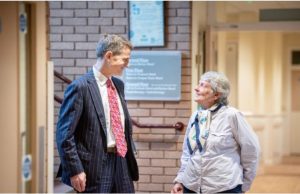One of ORI’s research focuses is Enhanced Recovery After Surgery (ERAS), an evidence-based approach to patient care.
The multimodal, multidisciplinary approach to the care of a patient comprises of a combination of evidence-based interventions in the perioperative period that aim to reduce convalescence by reducing the stress of the operation to retain anabolic homeostasis.
Historically, following illness or surgery, rest was prescribed and eating and drinking withheld or restricted until normal bodily functions returned. Early return to normal activity and function was thought to be deleterious or even dangerous to a patient’s recovery. This care contributed to poorly controlled pain and prolonged immobility for patients.
Over the last twenty years, the significant growth of ERAS pathways represents a paradigm shift in how surgical care is delivered. The new pathway included strategies to prepare patients for surgery, to optimise pain relief, reduce the surgical stress response, promote early mobilisation and was designed to empower the patient to regain independence as quickly as possible post-operatively. The approach was successful and has been confirmed as being able to improve clinical outcomes for patients and reduce length of hospital stay.
- ERAS re-examines traditional practices
- ERAS replaces traditional practices with evidence-based best practice
- ERAS covers all areas of patient’s journey through the surgical process
Professor Robert Middleton and Professor Tom Wainwright were among the first people within the UK to implement ERAS within orthopaedics. Their implementations of ERAS at the Royal Bournemouth and Christchurch Hospitals changed patient outcomes dramatically in 2007. Subsequently, this was published in 2010 and was the first report of ERAS implementation in the NHS. Professors Middleton and Wainwright continue to influence professional practice and promote the introduction of ERAS by providing consultancy and training services to national bodies, private healthcare groups, and individual NHS hospitals. The team at ORI continue to pioneer the research in this area, with contributions to guidelines, textbooks, publications, conference posters and implementation.
To find out more about the ERAS research that ORI has been involved in, please click here.





